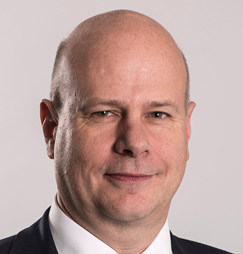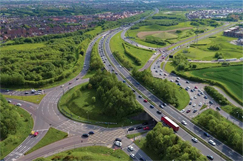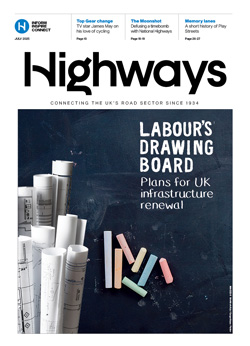Highways England may have rebranded as National Highways but the government-owned company is still going through its most challenging period to date; safety concerns over smart motorways, climate concerns about new roads, and shifting funding settlements all represent some species of gathering cloud. However, CEO Nick Harris (pictured) is plotting a course to smoother sailing.
Following his organisation's name change this year, Mr Harris used a recent speech to lay some of the cultural groundwork for a wider change of emphasis at the strategic road network (SRN) operator.
The net zero responsibility

Decarbonisation and climate concerns were, as one would expect, high on the agenda. Mr Harris addressed these head-on, referring to the government-owned company's decarbonisation plan and pledging a full and forthright commitment to tackling the environmental issues.
'There has been a huge increase in the focus on the environment, both in terms of biodiversity and carbon neutrality and as owners of significant infrastructure, it is a huge responsibility we bear, both to do something about that and take it into account in our future plans.
'We need to make good and rapid steps to improving carbon neutrality.'
National Highways' decarbonisation plan has already set the target of reaching net zero for its own operations by 2030, net zero for maintenance and construction by 2040, and net zero carbon travel on our roads by 2050.
John Larkinson, chief executive of the Office of Rail and Road, said: 'In terms of net zero, we already see some of that in terms of the [National Highways] performance specifications that we monitor today. I expect what we are going to see is an expansion of those commitments over time as the decarbonisation plan will crystalise into specific commitments included in specifications.'
He added: 'From my perspective, [the question is] when does the plan become a set of deliverables, which then become firm commitments, which then have to be met. That’s what we will be working on over the coming months and I suspect years because it is a big plan.'
National Highways has also pledged to put pressure on the supply chain through its procurement process, with companies already having to produce decarbonisation plans under contract frameworks.
Mr Harris stated: 'There have been a few schemes I can think of where we have tried to achieve carbon neutrality and come very close, whether that is through recycling materials or thinking about how we manage the movement of materials onto site and waste off the site.
'We have a lot of the components. We are continuing to see great innovation from the supply chain. As we turn our plans into firm delivery targets, it will drive the investment that we need to see particularly in the recycling we need to see more of in the future.'
As one would imagine, Mr Harris outrightly rejected any calls for roads to be defunded: 'Some still say we shouldn't be investing in our network on environmental grounds, but I firmly believe they are wrong. We are moving to a world of electric or hydrogen vehicles and a future with connected and autonomous vehicles and as we look at that they will need efficient well-maintained networks to run on.'
Renewal and preservation
In a more subtle, general shift, Mr Harris balanced the importance of future investment with a renewed declaration, you might say reminder, that the main job of highways is not about building but preserving.
Taking the story back to the beginning, perhaps to recapture some of the early optimism around the Highways England project, Mr Harris reminded his audience: 'National Highways, then Highways England, was formed to remedy the decades of under-investment in our strategic roads, one of the country's most valuable assets.
'Much of the network of course was built in the 1960s and 1970s and the rate at which we need to renew or maintain it continues to increase and this is going to be a big challenge as we look forward into the future.'

Asset management and capital maintenance 'was the bedrock of what we do', he said, and it accounts for more than £10bn of expenditure in this roads investment period (2020-2025).
In a somewhat less subtle point, he gave a polite push back against environmental campaigners like Transport Action Network, which, it must be said, are happy to indulge in their own brand of spin.
'I often hear RIS 2 (second road investment strategy from 2020-2025) described as the Government's £27bn road building programme, in a pejorative way.
'The reality is there is only really one RIS 2 project that could be described as a completely new road and that is of course the Lower Thames Crossing - a fantastic project that is bringing access to Kent's international gateways and much-needed relief to the M25 and the Dartford Crossing.'
In fact, not even this project is funded under the RIS 2 anymore by the looks of it, as the recent Spending Review cut National Highways' budget by some £3.4bn - mainly because delays to the Lower Thames Crossing and Stonehenge schemes mean monies had to move into RIS 3, according to the Department for Transport.
Mr Harris noted: 'The good news is that our programme remains largely intact following the review. Although the headline amount of money has gone down, this is largely due to the move of the Lower Thames Crossing and the A3030 Stonehenge tunnel to the right due to planning requirements. The important thing is the integrity of the five-year investment period has been protected.'
A central section of his speech was dedicated to the renewal of concrete roads, a programme backed by around £400m in this RIS. These assets make up almost 400 miles (4%) of the SRN and are mostly found along the eastern side of the country.
As these roads were largely built in the 1960s and 1970s, they are 'nearing the end of their working lives, and need vital upgrades,' Mr Harris said, adding that much of the material can be recycled.
Work on these noisy, ageing assets was highlighted perhaps to be symbolic of the wider renewal project National Highways hopes the public will sympathise with and understand.
The future of people and places
In fact, the most startling statistic of the speech was not related to the roads but to the people who work on them.
'We know that a generational workforce gap exists within the concrete road programme and in our other programmes, with 60% of the current workforce due to retire from the industry in the next 10 years. Given that the programme is set to continue for the next 20 or more years, this does present a bit of a challenge to the successful delivery of the programme.'
By any stretch of the imagination, this skills shortage represents a huge issue, especially when seen in the light of the panic over a shortage of HGV drivers recently. Like it or not, the SRN is still the backbone of the country's freight network and any Government that has to answer for supermarket deliveries, or the lack thereof, has to take that into account.
As Anthony Smith, chief executive of Transport Focus the independent consumer watchdog, said when asked about the future of roads in a net zero world: 'I think the last 18 months have really underlined just how crucial the country’s roads are to keep the country fed and well, and moving. The logistics sector have had a good crisis, quite frankly.

'So roads do have a massive future. Rail and bus help out but let’s face it most of us get our kit by road.'
National Highways is working on some long-term actions over the sector skills gap. It has established the Concrete Roads Centre of Excellence to upskill and develop the workforce, supply chain and wider industry and has also funded a new BSc honours course in concrete pavements in construction maintenance, created in collaboration with the University of Derby.
'This is the first academic course of its kind in the UK and the first programme on this course will start next year,' Mr Harris said.
On probably the most controversial subject at the moment, Mr Harris maintains that smart motorways are among the safest roads on the network and that progress is being made to improve standards.
When National Highways was first created it trumpeted its independence - a central reason why it changed from the DfT's Highways Agency into a separate government-owned company.
However, the recent calls from the Transport Select Committee to end the roll-out of the controversial smart motorway schemes highlighted the limitations to National Highways' agency.
Asked by Highways whether his organisation was independent enough to respond to the MPs' call on its own, Mr Harris said: 'We will work together with DfT [Department for Transport] on their response. That is not something that we will be responding to independently.'
Whatever one might feel about smart motorways, and Highways magazine has offered its fair share of critique, National Highways found itself caught between two outside political pressures.
As Mr Harris stated: 'We need to provide increased capacity and we need to do it in a way that is environmentally acceptable.'
Controlled motorways, where technology is used to aid flow but the hard shoulder is still in use, have been a major success for National Highways, enjoying a better safety record in recent years and more open lane miles than smart motorways.
Perhaps this select committee report will finally give the organisation a chance to celebrate this success.
Looking ahead, Mr Harris revealed National Highways is: 'Currently working on 31 projects, which will form part of the RIS 3 pipeline [2025-2030]. We are currently consulting on our route strategies looking at where future investment in the strategic network should be focused.'
He concluded: 'The really exciting bit is our digital future, the role of technology both in changing the experience for everyone using our roads, the information we can share, the capacity it can generate but also what innovations it can bring.'
In short, Mr Harris sees brighter skies on the horizon.





